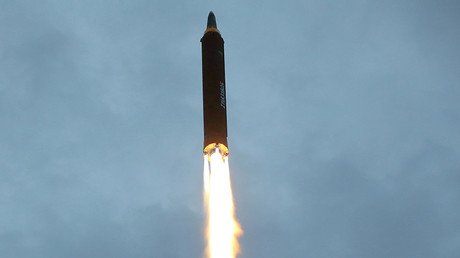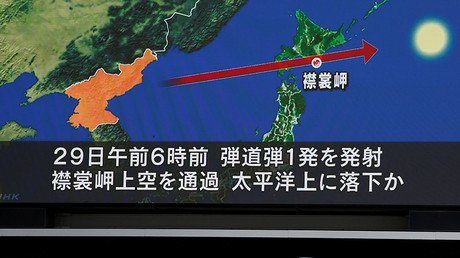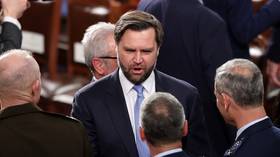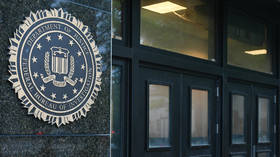‘Sanctions not working but only give Pyongyang time to master ballistic & nuclear programs’
The Russian-Chinese ‘double freeze’ initiative seems to be the only viable solution to the Korean crisis, former US diplomat Jim Jatras has told RT, warning that the tensions could soon reach a point of no return, where hundreds of thousands of people will suffer.
RT: The UN Security Council has just adopted new sanctions on North Korea. Now, this particular test missile, does it change things?
Jim Jatras: I think there will be a very strong response and reaction from Washington on this. I don't think they look at any missile or any test of a nuclear weapon that North Korea does as ‘just another test.’ I think they look at it as an incremental step in developing a capability that in the minds of American policymakers, not entirely unfounded, is at some point going to be a threat to the United States.
So when new sanctions are passed with the stated intention of causing North Korea to reign in their program and seems to have the exact opposite effect, you think at some point someone is going to say, 'Gosh, this isn't working really well', and try to figure out something new. I do not know if we are there yet.
RT: You mentioned that the new sanctions which have been put in place does not seem to work. What can be done?
JJ: Well, unfortunately, I think there are some people that do think there is a military solution. If you read the American media you see from various points in the political spectrum all the time people say: ‘Now is the time to act, we must do something militarily about North Korea while we still have time.’ And they say that knowing that it could have a devastating impact on the lives, ending the lives of hundreds of thousands, maybe millions of Koreans, maybe put us in the position where we are at war with China. But they are willing to undertake that risk. I do not think that makes any sense.
#US threatens to ‘cut China off’ from #dollar if it doesn't uphold sanctions against #NorthKoreahttps://t.co/gAe6zGQT02
— RT (@RT_com) September 12, 2017
On the other hand, if we talk about diplomacy, then we really have to be talking about trading something for something. If we want the North Koreans to reign in their program then what are we willing to do to back up in some respect? Against something like the Chinese 'double freeze' proposal which is considered a complete nonstarter by Washington policy makers.
RT: You mentioned the ‘double freeze’ initiative – proposed by Russia and China – where North Korea freezes its missile tests, while South Korea and the US will stop military drills. Yesterday, South Korea conducted military drills, and now we see this test from Pyongyang. Does this mean we moving further away from a diplomatic solution to the conflict?
UN unanimously approves new resolution, banning North Korea’s textile exports & capping its oil imports https://t.co/Q01PxjyeEQ
— RT (@RT_com) September 11, 2017
JJ: So it seems. And I think the next thing we have to see will be the reaction from Washington and Seoul after this latest North Korean missile test. My guess is we are going to see more saber rattling, more tests, more decapitation drills, more transfer of advanced weapons to South Korea. There is even talk that South Korea now wants to have American nuclear weapons stationed on their territory.
It seems that the knee jerk response here is to say. ‘Okay, the sanctions and threats against North Korea did not work, they continue with their test, so now we have to come in with more military exercises, more threats'. And then we'll be surprised when they keep testing their weapons.
North Korea threatens US with ‘greatest pain & suffering’ over sanctions push https://t.co/6F2FcgK5Jp
— RT (@RT_com) September 11, 2017
RT: This entire situation that has been developing this year is far beyond the usual DPRK-US tit-for-tat. Do you think the latest missile, flying through another country's airspace, will be treated differently? How are we going to have a military response on that?
JJ: Well, they have fired missiles over Japan before. And frankly, I think they are likely to do that again. I think we are at the point where the quantitative and incremental developments end up taking on a qualitative aspect, that we are nearing the point where there either has to be some backing down from this military confrontation, that has to be mutual, and we have some sort of diplomacy, or something is going to happen, somebody is going to do something that gets us past the point of no return. And as I say there are people here in Washington already advocating that. It is not at all thinkable in the minds of at least some of the policymakers here.
RT: President Donald Trump said after the UN Security Council adopted sanctions Monday, that the resolution doesn't mean a lot and can't be compared to what could come later. What reaction can we expect from the Trump administration?
JJ: That is a good question. As I’ve said, we’ll see the stepping up of the military drills and deployments in South Korea. We also hear calls for even tougher sanctions. Well, ‘gosh, we were reasonable on the American side, bringing to watering down that resolution in the UN in order to bring in the Chinese and the Russians along. That did not work. We’ll probably go back and try to press them for even tougher sanctions.’
As we know, the United States wanted a complete cut-off of oil going into North Korea, we wanted a freeze on the personal assets of Kim Jung-un and other top members of the government. That did not happen either. So I’m sure we will go back to the well on that.
I don't know if the Russians and the Chinese will go along with that. I sometimes have a sense that what they are doing is allowing Washington to spin out its rope, to see how far they want to go with this, try to moderate it, and hoping that at some point people here feel that they’ve reached a dead end and will think of something else. But I do not know, but I think it is a very dangerous strategy on their part if they think they can somehow humor Washington into a more moderate stance.
‘Time to try diplomacy, sanctions only give Pyongyang time to master ballistic & nuclear programs’
Most Americans and South Koreans support a diplomatic solution to the crisis, Simon Chun, a member of the Korea Peace Network has told RT.
“Seventy-one percent of Americans, whether Republican or Democrat support diplomacy, as well as over 80 percent of South Koreans support diplomacy,” Chun pointed out, underlining that the “most important variable will be public pressure.”
“Those people who support diplomacy who have patiently waited for sanctions to work, they are going to say, ‘enough is enough’, it is time to try diplomacy,” the activist believes.
N. Korea sits on $10 trillion worth mineral reserves with no funds or know-how to develop them https://t.co/pHaeO6qDip
— RT (@RT_com) September 13, 2017
"I also think that there is great public and also international pressure for diplomacy. Russia and China strong support the 'double freeze.' And I think this is a very viable approach."
Chun also explained that sanctions have so far done nothing to halt Pyongyang's nuclear development, and that it's time for a “policy change” in Washington.
“Sanctions have not worked, they are not going to work, and it will just give them [N. Korea] more time to master its existing ballistic and nuclear programs,” Chun told RT.
The statements, views and opinions expressed in this column are solely those of the author and do not necessarily represent those of RT.














